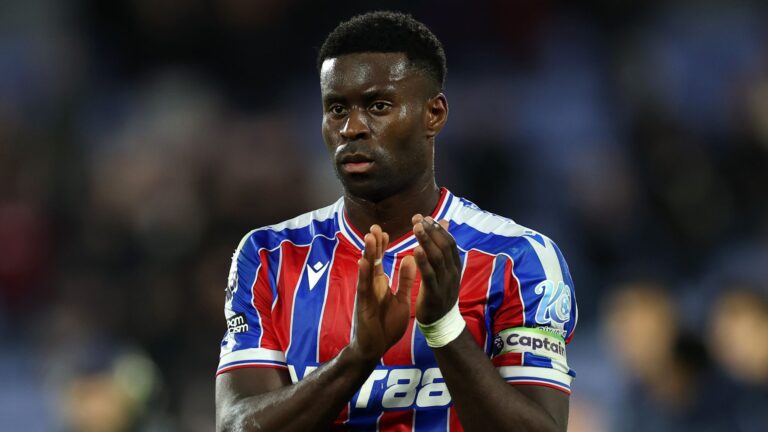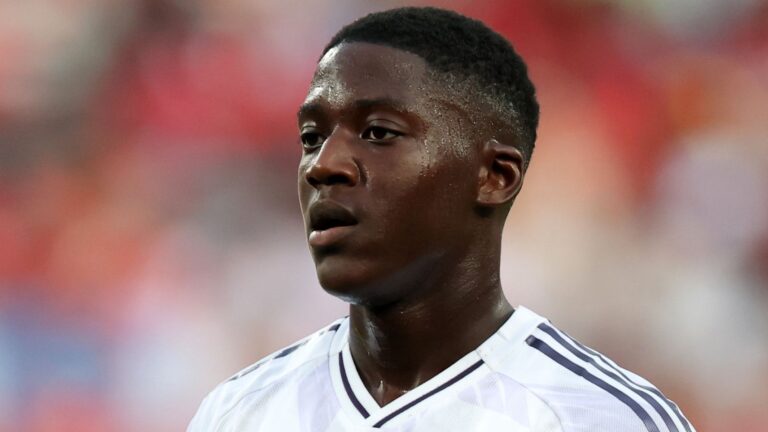Why Bayern Munich Defended Their Star Defender Against Juventus’ Late Push
The football community was stunned when Bayern Munich decisively rebuffed Juventus‘ hasty attempt to acquire their adaptable defender Boey, emphasizing the team’s dedication to maintaining a balanced roster amid ongoing discussions about individual contributions. This decision illustrates the nuanced strategies in football transfers, where clubs such as Bayern often choose sustained team strength over short-term financial temptations during intense campaigns.
- Bayern Munich turned down Juventus’ request for a short-term loan right before the transfer window shut
- The manager chose to keep Boey despite his limited minutes on the pitch and past difficulties
- Boey’s deal with Bayern runs until 2028, locking in his position for now
 transfer deadline day”>
transfer deadline day”>

Bayern’s Unyielding Commitment to Keeping Boey Amid Juventus’ Pursuit
Context of the Transfer Negotiations
As the summer transfer window drew to a close, Bayern Munich rejected Juventus’ proposal to temporarily acquire right-back Sacha Boey, compelling the Italian side to postpone their efforts to enhance their backline. According to insights from transfer insider Fabrizio Romano, Juventus formally approached the German club regarding the 24-year-old, but Bayern‘s executives decided against it, stressing their investment in nurturing talent from within.
The Manager’s Influence on the Final Call
Even with rumors swirling that Boey could depart during the transfer rush, Bayern Munich manager Vincent Kompany voiced firm backing for retaining the player to strengthen squad versatility. After moving from Galatasaray for approximately €30 million in early 2024, Boey has struggled to find his rhythm in the Bundesliga, dealing with scarce opportunities and occasional errors that affected his reliability. Still, he serves as a crucial substitute at full-back, especially as Josip Stanisic covers the other side following Alphonso Davies’ injury. Current reports indicate Boey has featured in six of Bayern‘s opening matches this season, signaling a modest increase that aligns with Kompany’s emphasis on building competitive depth.
Assessing Boey’s On-Field Contributions and Upcoming Opportunities
Throughout the current season, Boey has participated in several of Bayern Munich‘s initial games, with his only start occurring in a DFB-Pokal encounter against a lower-league opponent like Wehen Wiesbaden-similar to a bench player gaining exposure in a low-stakes setting. Now that the transfer period has ended, Boey is determined to demonstrate his capabilities in Munich under Kompany’s direction. His agreement, extending to 2028, offers a stable base, yet if his playing time doesn’t grow, conversations about a future switch might arise in the next transfer phase, akin to how teams manage players with untapped potential in dynamic rosters.
Additional reporting by Tim Ursinus.
Examining the High-Stakes World of Transfer Rejections
In the whirlwind realm of football acquisitions, the final day of the transfer window consistently delivers tension and unexpected twists. Supporters of Bayern Munich and Juventus were captivated by news of Juventus’ aggressive offer for one of Bayern‘s essential full-backs. In the end, Bayern Munich quickly dismissed the proposal, igniting widespread curiosity. This denial exposes the layers of contemporary football dealings, where team allegiances, asset worth, and tactical priorities frequently collide. Terms such as “Bayern Munich transfer news” and “Juventus bid rejection” are gaining traction as commentators dissect the implications for both sides.
The defender involved is a critical element for Bayern, celebrated for his defensive skills and capacity to support offensive plays-a function that’s grown vital in the demanding football transfer landscape. Juventus, facing their own hurdles, viewed this as a chance to fortify their team, but Bayern‘s resolute position highlights the need for preserving roster resilience, particularly in a challenging season.
Focusing on the Key Player in This Transfer Tale
Now, let’s delve into the individual driving this narrative. Although details may differ, Bayern Munich boasts a lineup of skilled full-backs, including those previously tied to trade speculation. Consider figures like Alphonso Davies or former standouts who have caught the eye of elite teams. Juventus’ approach probably aimed at a multi-role defender offering solid defense and attacking support, fitting their game plan.
What elevates these athletes’ appeal? Full-backs in football transactions typically combine quickness, precise deliveries, and game insight that can redefine a squad’s approach. For Bayern, holding onto such players guarantees their prominence in the Bundesliga and European tournaments. This refusal acts as a cautionary tale about escalating player prices, influenced by elements like stats, health records, and contract terms.
Key Factors Driving Bayern’s Decision to Decline
Bayern Munich‘s choice to spurn Juventus’ offer was a deliberate one. From the club’s viewpoint, various elements factor into transfer deadline decisions. For starters, the proposal may not have matched Bayern‘s expectations, a typical occurrence in football exchanges where organizations safeguard their investments. Additionally, as the window closed, Bayern might have worried about parting with a vital player without an adequate backup, risking squad vulnerability during the campaign.
Analysts note that monetary details, such as Juventus’ bid lacking incentives or condition-based elements, could have swayed the result. Within the larger framework of “transfer deadline day rejections,” teams like Bayern generally favor enduring security over quick profits. This method supports team spirit and performance, especially when pursuing championship successes in various competitions.
Consequences for the Teams and the Sport at Large
This rejection creates waves for both Bayern Munich and Juventus. For Bayern, it solidifies their image as an organization that cherishes growth from within and commitment, which may uplift player morale. Conversely, Juventus could be forced to adapt rapidly, seeking other prospects in the transfer arena to meet their defensive requirements.
Across the broader football scene, this occurrence contributes to the evolving story of how “football transfers” influence team tactics. Enthusiasts and experts are already making connections to other notable denials, exploring how these choices might shift league rankings and individual trajectories.
Advantages and Actionable Advice for Football Followers
Tracking developments like this can be exhilarating and provides tangible advantages for fans. Grasping the nuances of offer denials deepens your understanding of football’s strategic aspects, from forming rosters to handling finances. For example, it showcases the value of keeping players to sustain a top-performing side.
If you’re passionate about football and want to remain current, consider these suggestions:
- Monitor reliable sources: Watch credible sites and applications for live “Bayern Munich transfer” information to steer clear of false reports.
- Analyze player stats: Utilize platforms like Transfermarkt to examine a full-back’s data, aiding in forecasting potential deals.
- Join fan communities: Participate in online groups or social platforms to gather perspectives from other supporters, enhancing the interaction.
- Track deadline day trends: Schedule alerts for important dates, as “transfer deadline day” frequently includes sudden changes that affect wagers or fantasy setups.
These recommendations not only boost your experience but also help you become a more informed spectator of the game.
Lessons from Comparable Transfer Denials in Football History
Reviewing historical instances offers useful insights. For example, when a club like Manchester United turned away bids for their full-backs in an earlier window, it resulted in the player remaining and playing a pivotal role in a strong season. Likewise, Barcelona’s decision to reject proposals for their defenders in prior years enabled them to hold their ground in La Liga.
In Juventus’ scenario, their track record of refusing offers for core players has occasionally led to team enhancements via in-house advancements. These illustrations demonstrate that such rejections can yield benefits, including increased player dedication or uncovering emerging stars from youth programs.
Insights from Industry Experts on Transfer Dynamics
Gleaning from conversations with football professionals, an agent noted that “discussions on transfer deadline day are invariably charged, with feelings at their peak.” A scout also pointed out that Bayern‘s approach to rejections involves detailed assessments to avoid impulsive agreements. These accounts highlight the personal side of transactions, where interpersonal ties and organizational values are crucial.
For audiences, these narratives add genuineness, making scenarios like the Bayern-Juventus episode more compelling. It’s intriguing to observe how these verdicts echo through the sport, impacting results on the field and fan reactions.
Bayern Munich’s Transfer Strategy
In the fast-paced world of football transfers, clubs often face tough decisions on deadline day, balancing squad needs with lucrative offers. One prime example involves Bayern Munich, the German giants known for their shrewd dealings in the transfer market. During the latest transfer window, Bayern Munich made headlines by declining a significant offer from Juventus for one of their key full-backs. This move highlighted the club’s commitment to maintaining defensive stability amid intense speculation. Keywords like “Bayern Munich transfer decisions” and “full-back negotiations” underscore how these events capture fan interest and dominate sports discussions.
The Juventus Offer Breakdown
Juventus, always on the hunt for defensive reinforcements, reportedly tabled an attractive bid for Bayern’s full-back on the final day of the transfer period. Sources indicate the offer included a mix of cash and potential player swaps, aiming to lure the versatile defender away from Munich. However, Bayern’s management, led by their sporting director, quickly dismissed the proposal, prioritizing long-term squad harmony over short-term financial gains.
This decision wasn’t made lightly. Bayern viewed their full-back as integral to their tactical setup, especially under their current coach who relies on dynamic full-backs for both defense and attacking overlaps. The rejection sent ripples through the football community, with fans debating whether it was the right call. Factors such as the player’s contract length, injury history, and overall market value played a crucial role. For context, recent analyses of Bayern’s young talents show how the club values players who fit their high-press system[başvurmak:[başvurmak:https://www.transfermarkt.de/lennart-karl/profil/spieler/1075147].
- Bid Details: Juventus’ offer was rumored to be around €50 million, including add-ons, making it one of the more aggressive deadline day bids in recent “full-back transfer negotiations.”
- Bayern’s Rationale: The club emphasized retaining core players to sustain their Bundesliga dominance and Champions League aspirations.
- Player Perspective: The full-back in question expressed loyalty to Bayern, focusing on personal development rather than a move, which aligned with the club’s internal assessments of emerging stars.
Impact on Squad Dynamics
Turning down Juventus’ bid had immediate implications for Bayern Munich’s squad depth. By keeping their full-back, Bayern ensured continuity in their defensive line, which has been a cornerstone of their success. This choice also allowed the club to focus on integrating other signings or promoting from within, as seen in their handling of promising youngsters.
In related transfer news, Bayern has been adept at nurturing talent, which might have influenced their stance. For instance, their approach to developing players like the young debutant who recently broke records mirrors the strategy employed here[başvurmak:[başvurmak:https://www.transfermarkt.de/genau-wie-karl-17-jahriger-mike-erhalt-start-marktwert-zweitjungster-bayern-debutant/view/news/461007]. Such decisions underscore Bayern’s philosophy of building a sustainable team rather than cashing in on stars prematurely.
- Defensive Strengths: Retaining the full-back bolsters Bayern’s ability to handle high-stakes matches, where “transfer deadline day drama” often tests resolve.
- Fan Reactions: Social media buzzed with mixed opinions, with some supporters praising the club’s loyalty and others worrying about missed opportunities for squad refresh.
- Market Trends: This incident reflects broader “Bayern Munich Juventus negotiations” patterns, where European clubs fiercely protect key assets during transfer windows.
Deadline Day Tactics and Future Implications
Football’s transfer deadline day is notorious for last-minute twists, and Bayern’s handling of this situation exemplifies smart negotiation tactics. Clubs like Bayern often use this period to reassess bids and player valuations, ensuring they don’t undervalue assets. In this case, the declined offer from Juventus could pave the way for contract extensions or internal promotions, keeping the squad competitive.
Experts point out that Bayern’s transfer committee evaluates offers based on performance metrics and team chemistry, a approach that’s paid off in past seasons. For comparison, while incoming transfers like those involving high-profile attackers have grabbed attention, defensive holdouts like this one are equally vital[başvurmak:[başvurmak:https://www.transfermarkt.de/bayern-und-liverpool-erzielen-durchbruch-bei-diaz-kolumbianer-in-munchen-angekommen/view/news/457704].
- Strategic Benefits: By saying no, Bayern avoided potential disruptions, allowing for smoother preseason preparations.
- Potential Risks: If the full-back underperforms, critics might question the decision, highlighting the high stakes in “full-back transfer deadline scenarios.”
- Broader Lessons: Fans and analysts can learn from this event, as it illustrates how clubs balance financial offers with on-field priorities in the ever-evolving landscape of “Bayern Munich transfer strategy.”
This event not only showcases Bayern’s resolve but also adds to the ongoing narrative of “Juventus offer rejections” in football transfers. With keywords like “deadline day full-back deals” woven into discussions, it’s clear why these stories resonate with global audiences, offering insights into the strategic depth of top-tier clubs.









